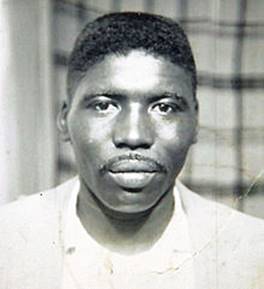 Jimmie Lee Jackson, 26 years old, unarmed, and black, was shot in the stomach and beaten by State Trooper James Bonard Fowler, at Mack’s Cafe, in Marion, Alabama, because Jimmie Lee had protested for the right to vote; Jimmie Lee lived a week.
Jimmie Lee Jackson, 26 years old, unarmed, and black, was shot in the stomach and beaten by State Trooper James Bonard Fowler, at Mack’s Cafe, in Marion, Alabama, because Jimmie Lee had protested for the right to vote; Jimmie Lee lived a week.
Trooper Fowler was not charged with any crime, and said Jimmie Lee tried to take his pistol. But that’s not what happened.
We heard something just like this from Officer Wilson when he recently killed an unarmed teenager, Mike Brown, in Ferguson.
Jimmie Lee, however, wasn’t murdered recently. His cold-blooded murder occurred fifty years ago and became the catalyst for an historic protest march in Selma, Alabama.
On February 18, 1965, Jimmie Lee was in an earlier march objecting that Blacks were denied their right to vote.
Jimmie Lee, a service veteran, a church deacon, a father and a laborer, marched with his mother, sister, 82-year-old grandfather, and several hundred protesters. Local police and state troopers attacked. Jimmie Lee and his family ran for their lives, and thought they’d found cover in Mack’s Café. The troopers charged into the café, like a lawless gang, beating people including Jimmie Lee’s Mom. Jimmie Lee fought to protect her. Trooper Fowler shot Jimmie Lee in the stomach. Troopers chased the wounded Jimmie Lee out of the café into the street and continued to beat him, stopping only when he went unconscious.
The Reverend Martin Luther King visited Jimmie Lee at the hospital. Upon Jimmie Lee’s death, he said: “We must be concerned not merely about who murdered him but about the system, the way of life, the philosophy which produced the murderer.” These words unfortunately still have significance today.
At Jimmie Lee’s funeral, the Reverend King said: “he was murdered by the brutality of every Sheriff who practices lawlessness in the name of law.” Former Mayor Rudy Giuliani might well have said that the Reverend King’s words were expressions of hate toward law enforcement.
King also said that Jimmie Lee “was murdered by the irresponsibility of every politician, from governors on down, who has fed his constituents the stale bread of hatred and the spoiled meat of racism.”
Jimmie Lee’s killing prompted the protest march from Selma to Montgomery, the state capital. On its first day, it was not successful. Sheriff Jim Clark’s deputies attacked the marchers with batons, tear gas and whips.
Former Mayor Rudy Giuliani and a choir of similarly sounding nay-sayers might very well have blamed those marching for demanding one rule of law for everyone.
The world recoiled from the images of lawless law men attacking marching protesters. As a result, Congress passed a law guaranteeing the vote to blacks.
Yet, the Trooper who killed Jimmie Lee was not charged with any crime for 40 years. Trooper Fowler pleaded guilty to second-degree manslaughter. Sentenced in 2010, he got six months in jail. This passed for “swift” justice in America’s version of racial relativity. Of course, this instance of justice illumined belatedly in Jimmie Lee’s case grants us hope that the recent killings may yet result in prosecutions and punishment.
Fifty years ago, at the Lincoln Memorial, the Reverend King asked the question, when will Blacks be “satisfied,” and he responded, when Blacks are no longer “the victim of the unspeakable horrors of police brutality” and when “justice rolls down like waters, righteousness like a mighty stream.”
We are still working toward that day, King’s dream, that “one day this nation will rise up and live out the true meaning of its creed … that all men are created equal.”
